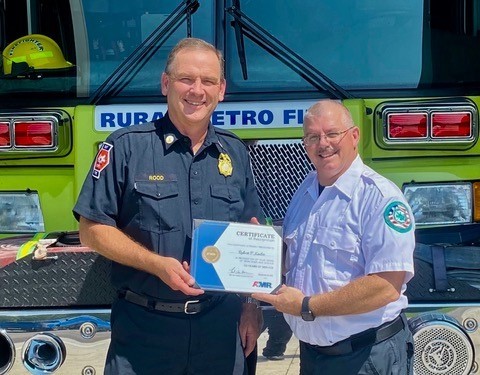Ya gotta love it to work 31 years for the same company, to learn how to flip a switch, to work 80 to 100 hours a week, week after week, and to be so content that at the age 54 you wonder to yourself – “Do they actually pay me to do this?”
Robert Paul Keeler is a long-time public servant, Knoxville native, a Fountain City boy and a 1986 Central High School graduate. He is a firefighting captain for Rural Metro Fire working at Station 27 on Strawberry Plains Pike. He’s also a paramedic, an EMT (emergency medical technician) and a hazardous materials officer.

Rural Metro Fire Capt. Robert Keeler
And he’s about as happy go lucky and friendly as they come. Has he ever met a stranger? Not likely.
This career began in his boyhood neighborhood on Lockwood Drive. His family’s next-door neighbor was John Nicely, then an assistant chief for the Knoxville Fire Department. “He used to take me and his son Rusty to the fire stations and we got to ride and climb on the engines and hang out with the firemen,” he says. “I was kinda hooked then and I also grew up watching ‘Emergency’ on TV.”
His first real job was at shop repairing car and truck bumpers damaged in accidents. He worked there for eight years (1988-1995) full-time while still working part-time at Rural Metro. The shop ultimately closed because it was cheaper to buy a new bumper than repair a damaged one, he said.
One other thing that led him to his career happened during the holiday season of 1990 when he was working part-time at Sam’s Wholesale. “I saw a fire truck and the guys were flowing water from a hydrant and I’d never seen that done and it was cool,” he says. “I was intrigued and we got to talking. They took my name and address and Rural Metro contacted me. I did the interview and took the tests and they hired me in September 1991.”
Keeler is “handy” with a toolbox of skills. For 22 years he worked with a buddy framing houses while working at Rural Metro. In 2009 he spent 18 months building his own home in the Carter community where he still lives.
He explains that he’s “gotten a college education without a degree” at Rural Metro. “Had to learn some physics plus science and math and apply those to survive. I’ve used them to learn how fire behaves and the properties of solids vs. gases. A civil engineering class I took at Pellissippi State helped me. Houses and furniture used to be built with wood and now the different materials used in construction burn differently and react differently to fire.”

Keeler is thankful for the continued training Rural Metro demands and says about two hours of every shift is training on some aspect of the job. “We go to school every day.”
His wife, Wendy, worked on ambulances for Rural Metro’s ambulances (pre-AMR) for 13 years. That’s where they met – answering a call – her on an ambulance and he on an engine. Today she works with Dispatch Health, a unique medical company that opened here in 2020. It provides in-home medical care to people of all ages, including children.
Relaxing is taking Wendy for a motorcycle ride on his Honda BTX or a day on Douglas Lake in their pontoon boat or shooting pool with her at their home. “And let me tell you, she’s a pool shark.”
Like most in this line of work, he has a second job. He travels to either Indiana, Ohio, Pennsylvania and West Virginia twice a month to teach basic firefighting skills to industries for American Emergency Response Training. He instructs fire brigades at chemical plants, power plants, paper mills and other facilities as required by OSHA. His classes include hazardous materials handling, rescue in confined or high-angle spaces, and basic pumping skills.
It’s easy to understand that in 31 years he’s experienced a slew of changes. “We now have stations in rural settings and sometimes the houses are hard to reach and by the time we get there we have to fight it from the outside in and that’s tragic for the people who lose their stuff. We’ve seen a lot of population growth and that has added challenges for all of us.” In his early years he says they would have three to five calls a shift. Today he says it’s more than 10-15 alarms per shift.
And about that light switch? “We all see a lot of really bad stuff in this job and I’ve seen so much of it that you become somewhat hardened to it. I use a light switch. When the call is over I turn that switch off. It can be awful what you see, especially the children, and it’s a lot to carry around with you.”
Tom King has been the editor of newspapers in Texas and California and also worked in Tennessee and Georgia.


